Will Machines Take Over the World?
The science questions that you've been sending in get scrutinised and analysed by biologist Sarah Harrison, statistician Simon White, mental health expert Olivia Remes and machine learning guru Peter Clarke. Find out why smaller dogs live longer than bigger breeds, why some people are more susceptible to hayfever than others, whether machines are destined to take control of the world, and what science says will make you happy...
In this episode
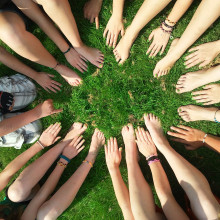
00:51 - Meet the panel
Meet the panel
Meet the team answering your questions this week: Sarah Harrison, Simon White, Peter Clarke and Olivia Remes...
Chris - First, let’s meet the panel: Sarah Harrison, Biologist, University of Cambridge - Sarah, you work with stem cells?
Sarah - My specialism is about using stem cells to try and make organ like structures and embryo like structures in culture, so instead of being in the environment of an embryo itself. Stem cells have quite a lot of capacity to do this pretty spontaneously. If you leave them to do their own thing they’ll make neurons by themselves, but what they don’t do very well is make these structure in a reproducible way.
Chris - But why do we want to do that at all? Why do you want to grow mini bits of body in a dish?
Sarah - It would be useful to study how they develop by using these models rather than using real embryos, but it’s also quite a good platform to start to test drugs as safely as possible.
Chris - So you could give your drugs to a petri dish rather than a person to work out whether or not a drug you're experimenting on might or might not work?
Sarah - Certainly with some organoid systems drug screening by using chemical compounds and putting them in dishes would work, yeah.
Chris - Thank you Sarah. So any questions relevant to biology, stem cells, and embryos should go Sarah’s way.
Simon White, Statistician, Biostatistics Unit also at the University of Cambridge. Stats, that’s a word that makes people shudder and often run a mile Simon, but it hasn’t in your case, you're a professional statistician. So have you any examples of uses and abuses of statistics to impart with?
Simon - I have. I think statistics is one of those words that instills fear, but really we should just think of it as the idea of trying to understand what lots of numbers can tell us. I think statistics shouldn’t really be about formuli and complex numbers, and lots of random numbers like oh, the number of people in this room is 5. But what does that tell us about the people in the room - nothing much. That’s what statistics is about, understanding what a number tells you, rather than the number itself.
Chris - It’s pretty important though,isn’t it. Because when we can start to ask questions about very large numbers of people we can learn, for example, what things cause certain diseases, or what things protect you against certain diseases, but you’ve got to look at lots of people to make sure you reach the right conclusion?
Simon - I might correct the word “cause” in what you just said. Sometimes a lot of them are associations rather than causal studies.
Chris - You can tell we’ve got a statistician in the studio. So anything to do with maths, and stats, and that kind of thing should go Simon’s way.
Sitting next to Simon is Peter Clarke, who is the founder of company RESURGO genetics. Peter, what is that?
Peter - What we’re trying to do is use some of the latest advances in machine learning that maybe we’ll talk about later, and really try and understand how cells work and how cells talk to each other and, through their communication, make you.
Chris - Machine learning, what do you mean my that?
Peter - This is really taking computers and getting them to look at lots and lots of data and trying to find the similarities, so seeing the same structures over and over again in data. Once you’ve got that, you can start building up pictures of how things really work even when you maybe don’t know ahead of time what they do.
Chris - So the computer essentially teaches itself to see the relationships between if it looks at lots of things that happen, it can begin to see what happens when this happens and it can begin to, therefore, may inferences, but you don’t know how it’s doing that, it’s just learning by looking at lots and lots examples?
Peter - In the same way that we don’t really yet properly know how your brain works, for example. You’ve managed to survive in the world though lots of examples and trying to imagine the the ways of doing things. But, just because it’s a black box doesn’t necessarily mean it doesn’t work.
Chris - What would your company sell then? What would I come to you asking to buy of RESURGO genetics?
Peter - That’s a good question and one that our investors are asking us a lot.
Chris - Is there a business model?
Peter - I think the business model in the long run is if you develop a far more sophisticated view of how these cells actually work, and how they communicate to make you that this becomes a very useful tool in medicine, and agriculture, and all sorts of other things.
Chris - Sarah’s trying to grow cells in a dish, you’re actually growing cells in a computer’s memory, effectively?
Peter - There’s a lot of overlap between what she does. We’re almost the computational modeling side of what she’s doing.

05:21 - How can you boost your confidence?
How can you boost your confidence?
Chris asks mental health expert Olivia Remes...
Olivia - I do. It’s the best exercise ever and I think everyone at home should try it as well because you’ll feel a lot more confident, a lot more powerful. It only takes 30 seconds to 2 minutes so I would like everyone at home and everyone in the studio to please stand up.
Chris - Off you go. I’m going to do this as well. So what now?
Olivia - You want to place your feet about a metre apart.
Chris - A metre! That’s quite…
Olivia - Yes, about a metre apart. Put your hands on your hips, pull your shoulders back and lift your chin. This is called the wonder woman pose. Now keep this four about 30 second to 2 minutes and, essentially, the background…
Chris - Are we allowed to breath Olivia?
Olivia - You’re allowed to breath. So basically, when we feel powerful, when we feel confident, our bodies expand, we take up more space, we spread out. But also, if you’re not feeling that way, if you’re feeling a little but insecure, you can trick your mind into thinking that you are actually powerful and confident and the way to do that is to do the wonder woman pose. This can decrease your stress hormone levels, it can increase your assertiveness hormone levels, and it just leaves you feeling more confident.
Chris - To people driving, don’t try that obviously. But guys, do sit down. Tell us, has that worked, do you now feel imbued with confidence ahead of the programme?
Sarah - Absolutely, yeah. It’s worked wonders.
Simon - I was a bit worried we were going to go into the Rocky Horror there.
Chris - But what actually is the rationale Olivia for doing this? Is it that it puts you in this because it’s making you adopt a posture which would be “associated,” using your word their Simon, with power - it makes you feel more potent even if you’re not, is that the rationale?
Olivia - That’s absolutely true. In the animal kingdom, and also when we’re looking at humans, animals that feel powerful, chimpanzees that feel powerful. Also humans when they feel very powerful they just naturally adopt these expansive postures. If you’re not feeling like that, you tend to slouch, you tend to fall into yourself and a way to trick your mind into thinking otherwise, a way to fake it until you become it, is to adopt this posture.
Chris - Fake it till you make it?
Olivia - Exactly. Fake it till you make it. This is all based on research from Harvard, and the person who did this looked at the participants who adopted these postures and she measured their stress hormone levels and all sorts of other things. They took more risks, felt more confident, all sorts of positive benefits.
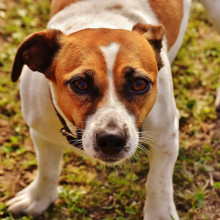
08:06 - Why do smaller dogs live longer than bigger breeds?
Why do smaller dogs live longer than bigger breeds?
Chris asks Sarah Harrison from the University of Cambridge why smaller dogs live longer than bigger breeds?
Sarah - Absolutely it’s the case. I think that’s why this makes a great question because, as Michael says, larger mammals tend to live longer, so elephants tend to live a really, really long time. But when you look within species, the trends almost reversed and this is why, as Michael points out for dogs, if you are a larger dog, you tend to have a shorter lifespan than a smaller dog.
It’s not just dogs, this trend holds in humans as well. The tallest every human that’s ever been recorded to have lived was about 8 ft. 11, but this poor chap died at 22 years old so being large didn’t gift this poor guy with longevity.
Chris - Those people are obviously a little bit exceptional aren’t they because something made them become extraordinary big compared to the norm, but going back to the original question about dog size,what is the reason why a bigger breed will be outlasted by a smaller breed?
Sarah - We don’t know the full answer to this and we think the reason behind this is because larger animals grow a bit faster. This means they’ve got a higher resting metabolic rate so they’re exposed to more reactive oxygen species that can lead to DNA damage. The other thing is these animals have a lot more cells in each of their organs which means more cells have a higher chance of getting some kind of somatic mutation that might lead to cancer or tumour regenesis. But, as I say, the full answer is not known.

09:60 - What's the difference between relative and absolute risk?
What's the difference between relative and absolute risk?
Chris asks statistician Simon White...
Chris - You see this in the newspaper quite a bit. You see people reporting on a science or a medical study and they say the relative risk in this group was X compared to people who didn’t smoke, or drink, or drive very fast the wrong way down the motorway or something. What does that terminology actually mean though?
Simon - This is a really good question and it’s one of these areas of science that over the years has become a very technical definition of risk. In its essence, absolute risk is the kind of risk we want to normally talk about - how many out of 1,000 people will die from say lung cancer? That’s what we want to know as a wider public when we’re thinking about where we want to prioritise certain conditions; whether we should be worried about certain things. However, most studies are done by comparing different types of patient groups across different demographics: age, sex. At which point you then make relative comparisons between those groups, so it’s how much worse is this for men than say for women? So you get a relative risk from the study but that’s not always the number that you want or is the best number to make it helpful to understand, that’s usually the absolute risk.
Chris - And that’s the distinction?
Simon - Yes. It’s about what those numbers are in relation to. So an absolute risk is an actual countable number of people. A relative risk makes no sense on it’s own - it’s only relative to something else.
Chris - But if you’ve done your study carefully and you’ve got, for instance, a group of people who you didn’t do anything to, you just watched them, and then you have a group who are analogous. They’re identical to that group as far as you know to the greatest extent possible, they eat the same things, they exercise the same amounts, the same body weight all that, and they have the same sort of genetic background. You do something to this other group - you’re comparing, you hope, apples with apples and so that relative risk is actually very informative there isn’t it if the second group that you do something to have a much lower chance of developing cancer or heart disease or something, that relative risk in the second group is informative?
Simon - Absolutely. A lot of the key results we know that inform public health and medicines that we use every day are based on relative risks from these kind of studies, so they’re not useless, they’re just a different way to communicate that information. And, in fact, the debate about how best to communicate risks is a longstanding challenge in statistics.
Chris - I was going to say, it’s not something that the general public often get told how to interpret. They just see all these facts and figures reported in various media and no one ever really explains to you how you should interpret or understand a lot of those points. And this, I think, is why people get very confused when they see one week a news story says “chocolate will protect you from dying of high blood pressure”, and then the next week it says “chocolate makes you fat and gives you high blood pressure” - then what should I believe?
Simon - Again, this question of causation and association. A lot of studies can’t actually definitively prove that one thing leads to another. A lot of them are certain kinds of observational study so we get these relative risks but they’re not always set in stone.

13:59 - What's the best way to deal with exam results nerves?
What's the best way to deal with exam results nerves?
Chris asks for the top-tips from Cambridge University's Olivia Remes...
Olivia - If you’re feeling stressed because you’re waiting for your exam results, or if you’re feeling stressed because of any other reason, there is some is something that you can do and it’s very effective. Basically, as soon as you feel this stress coming on to you, these worries, if there is something that you can do about the situation - do it. If not, then drop the thought and redirect your attention elsewhere.
Chris - Isn’t that easier said than done though Olivia?
Olivia - It takes practice and this is all based on research that has looked at problem focused coping versus emotional based coping. So when we ruminate a lot about something, when we obsess about something that’s stressing us out, something that’s worrying us, and it might interfere with our sleep, with our work, this can lead to anxiety and depression, so we want to avoid that. You want to use problem focused coping, which basically means focusing on solutions.
In the case of exam results, there is nothing you can do about it, so drop the thought. And a way to make it easier on yourself to do that is to place your attention on something else so focus either on the task at hand or focus on your surroundings. If you’re outside feel the wind in your hair, hear the birds chirping, notice the colour of the trees, be completely in the present moment.
What I think is very interesting is, Cornell did this study a while back and asked people at the end of their lives what they regretted most, and if there was something they could change. What most people said was they regretted that they had spent so much time worrying. Worrying does not lead to good things so it is best to just drop that. If you can solve the problem solve it, if not just redirect your attention.
Chris - I was in a maternity unit once and there was this picture of newborn baby, and the sign underneath said the first five minutes of a newborn baby’s life are the most terrifying of all, the most risky of all. Someone had written underneath - the last five minutes are pretty frightening too! But I get your point that we do spend a lot of time worrying about things and perhaps we could avoid spending so much time worrying about them.
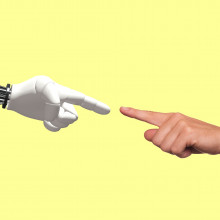
16:27 - What happened with the robots at Facebook?
What happened with the robots at Facebook?
Peter Clarke, founder of Resurgo Genetics, fills us in on the recent news story...
Peter - They were training these AIs to negotiate with each other and what they were trying to do was to model the ways humans negotiate with each other. So they were playing them lots, and lots, and lots of human interactions and trying to get them to learn the ways humans decide on what they're going to say. What happened was that they then set them free and got them to negotiate with each other and they ended up taking the human language and developing their own language on top of that apparently, according to the stories. But really, it was a very sort of simplistic thing, which has been seen many times before in computer science research where you get two competing artificial intelligences that are negotiating with each other that they do develop these ways of simple interaction.
But it really wasn’t anything very scary and I can read out some of their…
Chris - Can you understand it?
Peter - I’ll just read you out one snippet of conversation:
Bob says to Alice - I can I I everything else. And Alice says - balls have zero to me, to me, to me, to me, to me, to me, to me, too.
So that was one of their exchanges. Actually, what was happening is that they were transmitting numbers with little english phrases. So the to me, to me, to me, to me..
Chris - Ah. So those are numbers?
Peter - So that we them working out just an almost random way of taking the words that humans…
Chris - So it isn’t just gibberish, there is meaning in there?
Peter - No. There is meaning. They basically have evolved a way of taking words and just happening to use those words as a way of communicating relatively simple things to each other.
Simon - Where they also trying to work out the relative value of what they were negotiating for?
Peter - Yes, I think so. They were actually in a competitive situation.
Simon - Because, obviously, a lot of human negotiation is about mostly misdirecting people if you’re trying to get the better part of a negotiation.
Peter - Yeah.
Simon - If you’re trying to sell your car you always want to get the best price.
Chris - Do you think we could get them involved in the Brexit negotiations - would that work?
Simon - With language like that - maybe!
Chris - It seems it’d make more progress wouldn’t it. Elon Musk I think went on the record. He’s the guy who said Paypal and other ventures isn’t he. He said I think Mark Zuckerberg, Chief Executive of Facebook’s understanding of AI is “limited.”
Peter - I think this was something slightly different in that Elon Musk had really been coming out and saying, as he has for a while, really, highlighting some of the very real and significant dangers of this technology, and really calling for regulation. This is, I guess, where the serious point comes was that I think, to some extent, maybe Mark Zuckerberg was pushing back against that. It’s this debate about the level at which you’re regulating these technologies given that they can be, potentially, so powerful in the future, and I think that was the more interesting debate.
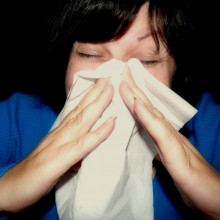
19:49 - Why are some people more susceptible to hayfever?
Why are some people more susceptible to hayfever?
Chris put this question to biologist Sarah Harrison, after asking the panel who suffered from hayfever...
Olivia - I have allergies to a million things so hayfever is just another one on the list.
Chris - Peter?
Peter - No.
Chris - You have escaped.
Peter - I used to have it - I don’t know what happened.
Chris - Your immune system forgot how to…
Peter - Yeah. It’s slightly worrying.
Chris - Simon?
Simon - I’m afraid - I’m drugged up today.
Chris - Another one. I used to get hayfever but it seems to have got a lot better. So, Sarah, are we so unusual. It seems that you have 100% hit rate in the room almost, apart from Peter.
Sarah - Well, I don’t have hayfever, but it does affect what’s estimated to me about a quarter of the people in the world.
Chris - And has that changed?
Sarah - That’s interesting. Pollution levels have been blamed a lot for a hayfever epidemic, if you like, but I don’t think it’s the only factor that increases your susceptibility to this really. It’s hayfever is a type of allergic rhinitis, if you want a more scientific name for it, and this is the same disease that makes you allergic to pet hair and other indoor allergens. It’s not the allergen itself that causes your symptoms as you’re alluded to, it’s the immune systems inappropriate reaction.
Chris - So the allergen is the thing in the environment that you are reacting to like the pollen or the pet hair?
Sarah - Absolutely.
Chris - And it’s being seen by your immune system and that causes the symptom which we call an allergy?
Sarah - Yep. Your immune system recognises molecules on the surface of these little particles and wrongly identifies these molecules as molecules belonging to an invader, and so the immune system reacts to try and clear your body of this invader. That means that you make antibodies and this leads to the cells making histamine, and it’s this chemical histamine that inflames your nasal passages, makes your eyes run and you nose run and everything itch, and makes you feel really terrible.
Chris - This is clearly bad so why should the body allow that to happen?
Sarah - That’s a good question. We don’t really know and there’s a lot of genetic variation in how the immune system works and how it’s set up, so a lot of it is thought to be down to this genetic variation. In fact, it’s a bit of mysterious disease because scientists have only just, in fact there’s a paper last week that pinpointed the real offenders of all the different cell types in the immune system that are causing this allergic rhinitis, and that’s the type of T cell called the Th2.
Chris - So a white blood cell?
Sarah - Yep, absolutely.
Chris - And that cell is the orchestrator of that response is it?
Sarah - Absolutely, as far as we know. As I say, there’s not as much known about it as you might expect for a disease that supposedly affects a quarter of the world’s population.
Chris - Because one highlight, or one thing that’s a recurring theme on this subject is that we’re all living a life that is too clean and sterile and there is this idea of the hygiene hypothesis. We’re not getting enough dirt exposure, not enough stimulation for our immune response and, therefore, it’s sitting there twiddling it’s thumbs and thinks well, I may as well react against something that’s harmless then?
Sarah - Absolutely. And if you don’t have enough of this exposure to this sort of thing in early life it means you never really build up a tolerance to detecting these allergens and the molecules on their surfaces in the environment. It’s also been linked to stress. I don’t know whether Olivia knows anything about this higher susceptibility.
Olivia - You're absolutely right and it’s very true that if you’re feeling stressed. Allergies have actually been linked to poor mental health and, again, we don’t know which comes first. With a lot of things in science it’s the case to this as well. You’re absolutely right. When you’re feeling stressed then your body is a little bit more susceptible and you could react even more to things in the environment that you normally wouldn’t.
Chris - Peter ?
Peter - Yeah I agree. I think everything's connected very much and I think this probably something that’s going to come out more and more over the next few years is the extent to which all of our systems are interconnected. But there is one thing that a lot of these allergies you can actually cure them because really it’s your immune system thinking that this thing is a bad thing that it’s trying to get rid of. I don’t recommend anyone try this at home but, for example, if you’re allergic to cat or dog hair there are treatments by which you eat the allergen. The cat and dog hair goes through your digestive system, and your body’s immune system can actually learn that these things aren’t bad for it. This is a way, for example, you don’t start reacting badly to your meal that you’ve just eaten or something like that. It’s a very interesting balance between reaction and non reaction - you can play with that.
Chris - Indeed. Researchers at Addenbrooke’s hospital in Cambridge at Cambridge University have actually managed to turn people with life threatening nut allergies into people who consume those nut perfectly happily every day by doing exactly as you say. There’s something about the presentation to the immune system of eating something which can familiarise you and abolish the immune response.
Olivia - You know I have exactly tried what you were speaking about and it’s absolutely helped me with my allergies. Also, what I found very useful, and there’s a lot of research on this, for people who have allergies to try an elimination diet where you pretty much eliminate everything you think you might be allergic to. Start with the bare basics, which is exactly what I did, and you work you way up. For example, celery, that was one thing that I was allergic to before. Because some doctors can be quite unhelpful. They just see you for 5 minutes, and that’s about it, and tell you to take more medication. I didn’t want to go down that route so I took matters into my own hands and basically just started off by have a centimetre of celery for two months and just increased that. Now I can have celery.
Peter - Had you been eating much celery beforehand or is it something that you only did very rarely?
Olivia - I’m from Canada, and in Canada my allergies are a lot better than here in England. As much as I love England, I don’t know what it is about the environment here that just makes me sick. I’m okay eating celery in Canada but not here though. Now I am, but not before.
Chris - We should caution people though. If you do have life threatening allergies, do be careful about this sort of presentation approach, because the people who do this in the hospital start with literally amounts that you cannot even see and then slowly scale it up in a safe way. So, it can be done and it is safe if done in the right hands, but do be cautious about just eating things you might be allergic to.
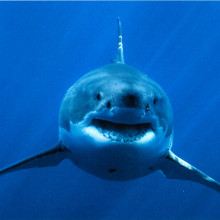
26:41 - More likely to die in a shark attack than a plane crash?
More likely to die in a shark attack than a plane crash?
Statistician Simon White gets his teeth stuck into this one...
Simon - This is one of those really interesting questions because it goes back to the heart of one of the problems of statistics, because your absolute chance of dying from a shark attack is higher than your absolute chance of dying in a plane crash, as in the number of people on the planet that die from those two causes. However, that’s not really a useful number because it doesn’t put it into the context of any other forms of how you might die. Also, you have to remember that in statistics that the population average, so across the entire planet. How likely you are to die from a shark attack is a very different question. Because if you never fly, you’re never going to die from a plane crash.
Chris - So if you don‘t go in the sea you’re not going to get eaten by a shark either?
Peter - So, there’s a big difference there between population level statistics and individual level numbers.
Peter - I was wondering is it more likely that you die of a shark attack after you plane has crashed into the sea? Is it commonotorial?
Chris - How does that sit with you?
Simon - Actually, also part of that question is you’re more likely to be in a plane crash, but people survive a lot of plane crashes now.
Peter - But how many of them get eaten by sharks?
Simon - Actually, there are very few plane crashes over water.

29:01 - Quiz: summer time
Quiz: summer time
Let's see which of our panel can win the infamous 'Naked Scientists Big Brain of the Week' award...
Chris - As promised we have a little quiz for our panel and for you at home… We need to divide you up into two teams so we’re going to have Olivia and Peter together and we’ll have Sarah and Simon.
This week, our quiz theme is the summer! Or at least what we refer to as the summer here in the UK…
Sarah and Simon are up first...
Q1 - Death Valley in California. What is officially the hottest place on earth and how hot is it?
Sarah - Is it the surface of the Earth we’re talking?
Simon - When we say on Earth.
Chris - If I had a thermometer and I put it down outside.
Simon - So not in volcano then?
Chris - No. Couldn’t get away with a volcano.
Sarah - I think we were both thinking the same thing there to outsmart Chris.
Simon - Obviously the thermometer would melt in a volcano.
Chris - I like the way you’re thinking though but what do you reckon? So the hottest place on Earth and how hot? I gave you a clue of the location.
Simon - A desert would be obvious.
Sarah - Yes, you would think a desert. How hot?
Chris - The clue was in the name - I said Death Valley. How hot do you think it was?
Simon - 60 or 70.
Sarah - I would have said 65, something like that.
Simon - Yeah. We’ll split the difference we’ll go with 65 degrees C.
Chris - The hottest temperature reach 50 degrees celsius and the record was set in 1913 at 56.7 degrees.
Q2: When it’s hot, there’s nothing quite like an ice cream; but which country on earth consumes the most?
Olivia - It’s got be be somewhere hot.
Peter - It’s got to be the States, I would imagine. Don’t you think?
Olivia - The States? We can go with that. I love ice cream and I’m from Canada.
Chris - But with respect, there’s one of you Olivia so.
Olivia - Yes.
Chris - You’re not going to eat more than the whole…
Peter - This is not per capita then? Is this per capita?
Chris - This is taking the country that’s got the biggest appetite as in en mass.
Peter - I would imagine that had to be America.
Olivia - I suppose if you go by the waistline I should not be saying that.
Peter - If you go in an American supermarket it’s ice cream.
Olivia - Alright. That’s why I love American supermarkets. Let’s go with that.
Peter - The United States of America.
Chris - China - they stole the ice cream crown from the US in 2014, consuming a massive 5.9 million litres of ice cream per year. In the Uk we eat much less, only 0.35 million litres in 2014.
Q3: After finishing your ice cream, why not go for a swim (waiting 30 minutes of course)... And with that in mind I want to know what is the average temperature of the sea around the UK coast in summer?
Simon - Well, we’ve got the current that warms us up coming across the Atlantic, so that’s side’s warm. Then we’ve got the North Sea coming down. So the average around the whole coast of the UK?
Chris - In summer.
Sarah - It always feels like -40 whenever I go swimming.
Simon - But then we go skating.
Sarah - Maybe the teens.
Chris - Going to have to hurry you.
Simon - Let’s go 12.
Sarah - 12.
Chris - Not bad...
15-20 degrees. The North Sea - and in particular North of Scotland - is much cooler at an average of 10 degrees in summer, compared to the English Channel where temperatures can reach up to 20 degrees.
Q4: From wet to dry - what is the driest place on Earth?
Peter - I think it may be some patch of dry rock in Antarctica.
Olivia - We can go with that.
Peter - That’s just a guess, but I think there’s some very, very dry bits of Antarctica.
Olivia - I was thinking, I don’t know why, for some reason. Maybe because I just loved it there but I was going to say some place in Morocco, but we can go with Antarctica. I like your answer better.
Chris - McMurdo Dry Valleys, Antarctica - they haven’t seen rainfall in over 14 million years… They are surrounded by extremely high mountains which even block the flow of ice.
Q5: Speaking of a lack of rainfall, how much of the earth is covered in desert?
Simon - That’s going to be a very small percentage.
Sarah - It depends whether we count Antarctica as a desert, or that small part of Antarctica.
Simon - It’s only 33% so about 3 or 4 %?
Sarah - I’d go 4%.
Simon - Let’s go 4%.
Chris - Approximately 10%. 71% of the earth is ocean, and of the remaining 29% around ⅓ is desert. That may seem high, but the definition of a desert is anywhere that has a moisture deficit over a year - so more evaporation than rainfall.
Q6: Sticking with sand, what is the world record for the tallest sandcastle ever built?
Olivia - You mean in metres?
Chris - Yeah. You can give me metres. I suppose I could quickly try and do a conversion but yeah, metres would be good. And decimal points as well please to keep Simon happy.
Olivia - The bigger the better.
Chris - I need a height - roughly.
Peter - Oh, 50 feet.
Olivia - Okay, we’ll go with that.
Chris - Can we have that in metres. It’s a metric programme.
Peter - I’m not sure we can.
Olivia - We can ask the statistician to do the quick mental conversion.
Simon - That 100 metres.
Chris - That’s quite tall. That’s quite high.
Peter - 50 feet is not 100 metres.
Simon - I didn’t say I’d give the right answer.
Chris - They’re trying to throw you off - don’t listen to him. Just give me an answer in metres.
Peter - 15 metres, 20 metres. Between 15 and 20 metres.
Chris - 14.84 metres. It was constructed on February 10th, 2017 this year on a beach in India. It took 9 days to build and had a circumference of 160m at the base.

36:32 - Why is our circadian rhythm not 24 hours?
Why is our circadian rhythm not 24 hours?
Chris asks Sarah Harrison from the University of Cambridge...
Sarah - I think you can define a circadian rhythm as any physiological process which occurs in cells on a 24 hour cycle or thereabouts. Each cell in the body has a set of genes which act as an internal clock making sure that every cell can keep to this 24 hour rhythm. In fact, the word circadian is Latin and roughly translated it means about a day. But, the question is absolutely right, the average human circadian rhythm is a little bit longer than that - its. 24.15 hours or thereabouts. Actually this is genetic variation so, individual by individual, every person has a slightly different length to their circadian rhythm. Some people people will have circadian rhythms a little bit shorter than 24 hours and some people have circadian rhythms that are a little bit longer. In fact, this genetic circadian rhythm can actually impact on your day to day behaviour and maybe Olivia will know a little bit more about this. If you’re a morning lark sort of person, so you’re good in the mornings, you can get yourself going - so certainly not me - then you tend to have a shorter circadian rhythm. If you’re a bit more of a night owl then then you tend to have a longer circadian rhythm.
Chris - So, Simon nighttime or owl I see you nodding there.
Simon - I used to be very much a morning person, and then I went to University and that slipped.
Chris - Yeah. I’m definitely an owl. I don’t function so well in the morning. Peter, are you a lark or an owl?
Peter - An owl.
Chris - Olivia an owl or off to bed early?
Oliva - Not an owl. Off to bed very early.
Chris - Isn’t that interesting. So why does that happen?
Sarah - Even though each cell has it’s own individual clock, all of these clocks need to be ticking with the same frequency if you like, otherwise, that would be no good to anyone. So the brain has a master clock in an area called the suprachiasmatic nucleus, and this master clock can be entrained by environmental light, essentially. It’s connected to the retina so it can sense light coming in from the environment and it’s also connected to a hormonal system so it can send a long range signal to all the cells in the body telling them essentially what time it is. As the questioner said, our circadian rhythm can be entrained to the 24 hour day and that’s why evolution has tolerated a little bit of variation either side of that because every day that you’re exposed to this environment light, that means that your circadian rhythm will be thereabouts 24 hours. If you take away these intrinsic cues, you essentially go and live in a house with no windows for a little bit, your rhythm will drift back to what’s been genetically coded, so it will slightly vary from this 24 hour cycle, and this is what’s called a free running circadian rhythm.
Chris - I think some blind people who lack the connection between the retina and the brain that you mentioned, they do have that don’t they, so their clock actually wanders with time, it slowly drifts off and they’re in a state of almost perpetual jet lag but then they do have an effect of trying to maintain a regular cycle and getting up at a certain time by setting an alarm clock, and that can help to keep them on track.
Sarah - It really can. I think there have been lots of people who want a better cure for jet lag. There was a study in the late 90s I think which showed, or seemed to show that if you shine a light on the back of your knees you could cure jet lag. As bizarre as this it is later turned out to be not the case. I think the only way to cure jet lag is to expose yourself to that early morning light and get yourself back in the rhythm.

40:27 - What's the best way to be happy?
What's the best way to be happy?
Cambridge University mental health expert Olivia Remes suggests...
Olivia - Two things:
Number 1) relationships. One of the longest running studies on happiness, done by Harvard, shows that contrary to what most people’s goals are today, which a lot of surveys are asking young people what their goal in life is, and it is to become famous and wealthy. It is not these that make us happy rather, it is having strong and supportive relationships.
Number 2) just going for a walk. Being in nature makes you more creative and just resets your system.
Chris - There was a study done where they took people away from their environment and put them in the wilderness for just a few days and measured their stress levels, and their anxiety levels, and their overall feelings of wellbeing before they went and after they went, and the difference was stark, staggering...
Olivia - Yeah, I know. It’s really relaxing and just improves your wellbeing and just makes you feel happier.

How do machines actually learn?
Chris put this question to Peter Clarke from Resurgo Genetics...
Peter - There are similarities. The way you can imagine your brain working is there’s a bunch of neurons, maybe about 100 billion neurons in your brain, and they’re all wired up. Each one of them is taking in inputs from another neuron and deciding how to behave and firing out its message, which is then being input to all these other neurons. Really this is a fairly simple core underlying structure behind all of the brains in nature but it’s really how all of these neurons work together. You have this property in nature which is called “emergence” where a lot of simpler things interacting with each other lead to high level, more complex behaviour and you see this over and over again.
One of the best places to see that is in a bees nest or something like that where each individual bee is behaving in a relatively simple way, but together they manage to create these huge hives which can think in far more sophisticated ways than any one of the individual bees can. The same process is happening inside your brain and across you body and all sorts of other ways. These are called “connectionist models” so models of how simpler components can come together and, through their interactions, lead to a higher level, more complex behaviour. Our brain works like that, and these artificial neural networks work in exactly the same way, by the same process.
There are a bunch of aspects in which they’re not the same. We really don’t understand all sorts of aspects of how human brains work, and we also don’t understand how cells work. So, we can’t really say, in a very precise way, they work in the same way as the way humans learn but they do use very, very similar processes.
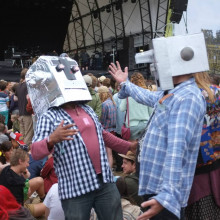
Could machines take over the world?
Chris asks computer guru Peter Clarke...
Chris - So, in other words, what he’s getting at is could the mechanisms that you were referring to about how machines learn, how we're writing programmes that enable computers to learn and become intelligent in their own right, could they, potentially, invent a way to see us off the planet?
Peter - Yes they could, and that’s the short answer. We’re dealing with amazing technologies. There’s an amazing advance happening and as this unfolds into society and starts to transform the way we do everything, it probably going to be a far larger impact than the industrial revolution, or the internet, or electronic communications. Because, we can see a point between 10 and 30 years depending on the particular person you believe, where we’re going to develop technologies. We’re going to develop these types of artificial neural technologies which will then surpass human capability.
The moment that happens, we’ve developed these systems, they will then be able to develop systems that are more sophisticated than themselves. So this is the idea that you get this sort of sudden runaway process whereby within a relatively short space of time computational power you hit the physical limit. You’re hitting physical limits which means that it’s incomprehensible compared to the way our brains are. You can make the argument whether it’s the most transformative point in human history or most transformative point in the history of life on Earth. I suspect you could probably make the second point.
It’s a potentially very dangerous situation and we all need to wake up and question about what world we want to live in because, at the end of the day, these intelligences can do almost anything but they need an objective. So what we need to do is think about objective, think about how we frame this and try and make sure, that for example, in The Terminator Apocalypse it’s objective was set, I think, to stop war. And so, the way to stop war is get rid of humans because humans create war so you need to be very careful…
Chris - Be careful what you wish for.
Peter - Yeah. It’s a combination of badly specified objectives and unintended consequences. Also we need to make it act for the human good and the good of the planet.
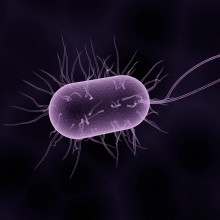
46:30 - Are there any single-cell organisms that eat multi-cellular organisms?
Are there any single-cell organisms that eat multi-cellular organisms?
Chris asks biologist Sarah Harrison...
Sarah - It’s certainly a great question because it makes us think about how we view the food chain, and we tend to think of it as a linear progression where a small animal or organism is eaten by a larger animal, and then a still larger animal eats large animal. But, actually, feeding really when we define it properly is more about one organism drawing resources, probably organic compounds and nutrients, from another. So when you think about it like that unicellular organisms are resources from multicellular organisms all the time, it’s just we don’t call that predation we call it parasitism. This is really common in evolution because if there’s a niche, evolution will evolve some kind of organism to exploit it. So, when you think about it, when you think of an arch predator like a great white shark who think those poor people who die in a plane crash, the only thing above that arch predator in the ecosystem is the parasite which feed off it really. There are examples where perhaps more true to the question a large single cell, or organism can engulf very microscopic multicellular organisms as well.
Chris - I suppose, if you’re thinking about a human being is outnumbered by the bacteria that live on the human being, and some of those bacteria are surviving by damaging our own cells, busting them open, and then they vacuum up the debris and eat it, and assimilate it. That’s sort of what you’re saying? In essence, a single cell thing like a bacteria is eating you therefore deriving a life from us.
Sarah - If it’s pathogenic, yeah. In some cases it’s a bit of back and forth so even though a bacteria’s drawing some resources from its host, it might also be giving something back that's beneficial. So these things can work both ways as well and then it’s less one feeding off the other.
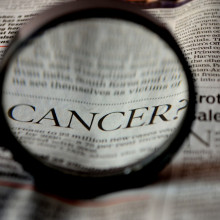
48:43 - Why does everything seem to both cause and cure cancer?
Why does everything seem to both cause and cure cancer?
Chris put this one to Simon White from the University of Cambridge...
Simon - There are actually very few studies which have shown strong causal links between these factors and cancer - a lot of them are associations. One of the main problems with a disease like cancer, when you’re trying to study its effect when various aspects on the outcomes of cancer, is that cancer is really an older age disease. I generalise there, not all cancers but in broad strokes. So, if we’re looking at people now in their 30s and we say what do you do? We won’t really know if that has an effect until those people are in their 60s, so that would be a causal study. Unfortunately, that takes 30 years and in terms of public health, we kind of need an answer yesterday. So we do a lot more association studies and that’s where some of these competing, contrasting results come from. There’s also a lot of issue with especially diet studies about how we interpret and record diet, so diets have intrinsically changed over the last 50 years. Foods that we have available now in the UK weren’t around 30 years ago. So, can we really say that the impact of various lifestyle factors will cause cancer? - probably not.
Chris - So when people turn round and say the Mediterranean diet, which is dominated by olive oil, a lot of fresh fruit and vegetables, a little bit of red wine every day, that sort of lifestyle and diet combination that will improve your mortality, actually that’s in the context of people who came from a very different life experience, lived a long while ago really?
Simon - And lived in the Mediterranean.
Chris - And lived in a different geography. We’ve now got people who are different age groups eating a different diet really en mass, and with a different upbringing and, therefore, it may not be relevant?
Simon - And this is one of the issues in statistics is generalising results, so we can’t do the study we want to do. It’s not ethical and it would cost too much money, so we have to work with the information and data we can get and then we have to work out how much that can generalise. This is really one of the great questions of statistics is from the study we have and people we have, what can we say what can we say, what can’t we say? Statisticians, they kind of call us the buzz kills of science because we are usually the ones in the corner going um, is that really true?
Chris - But something like the study done by Richard Dole, who’s died now, but he famously did the smoking doctors study and that was a very well powered study. It had a very big group of people that were followed for 50 years and did categorically show that there was a very big excess of chest diseases and cancers in the individuals who smoked compared with the people who didn’t smoke.
Simon - Yes, and that’s the sort of long term study. It was still an association because he didn’t force certain people to smoke or not smoke.
Chris - He wouldn’t have been allowed to do that though would he?
Simon - No, and that is one of the ethical requirements. To really be true whether something causes cancer or not we have to get a group of people, give it to them, and then another group of people who don’t have it, and then follow them for 30 years.
Chris - Peter?
Peter - Yeah. I think this a really good example with smoking where you have a very binary thing and it’s obviously very bad for you. But it still takes this huge great long 50 year study to work out that smoking is bad for you. Really this is where, in some sense, you can make the case that statistics and these types of studies actually fail public health and public good because they’re not going to determine all of the things in the world that are dangerous for us. Because things where you have a very broad exposure to something, which is not binary and easily definable like whether you smoke or not. Actually wouldn’t it be fair to say that there could be a vast number of things that we're being exposed to every day which are dangerous to us which we're not being properly… We need a different framework for working out those things rather than these frameworks which can’t pick those signals out from statistical background.
Simon - Just to defend statistics from some comments you made there. Statistics is about understanding what the data can tell you and I don’t think anyone would say that statistics are wrong, they’re a tool.
Chris - As one person said it me the other day that there is reality and you can’t call reality wrong when it doesn’t agree with what you think is going on.
Simon - Statistics is a way of quantifying evidence, and this is where an abuse of statistics occurs when people run these studies and say drinking coffee increases your life expectancy.
Chris - I was really buoyed up when I saw that study. I that that was brilliant - I should live forever the way I’m going.
Simon - But the problem is they've reduced it down to a single aspect - coffee. And we all know that that’s not reality. So the statistics has picked out from all of the various parts of the diet and all of the various lifestyle factors that coffee has this effect, but in combination with a whole host of other things and, yes, these problems are very complex. That doesn’t mean that the statistics is there to tell you actually, we probably don’t know.

54:15 - Is social media affecting mental health?
Is social media affecting mental health?
Chris asks mental health expert Olivia Remes...
Olivia - It absolutely does. Looking at Facebook, being on your computer right before you go to bed actually disrupts your sleep. That can increase your risk of anxiety and depression and also being on social media a lot has been linked to narcissism, to low self esteem. Right now there are issues like cyberbullying, online harassment. Also, when you go on Facebook, everyone seems to post these rosy to create this kind of glamorised view of their life. Everything looks rosy, looks beautiful, which might not necessarily be reality.
This study that has been cited a lot in research - it was really interesting - it was showing that if you’re looking at Facebook, and if the stuff that you’re seeing makes you feel jealous, then if you’re feeling jealous that can lead to depression. But, if you’re not feeling jealous, you’re okay.
Chris - Are you saying then that your friends being happy can make you unhappy?
Olivia - Exactly. It’s not so much your friends. I suppose it’s people see it more as showing off because people seem to post status updates like oh you know, I just got this promotion, look at this wonderful meal that I’m having, this trip that I’ve been on. They're not going to tell you about the things in their life that aren’t going so well like the fights that they had with their boyfriend last week. Maybe their boss said something to them and they were crying that day.
Chris - You could sued for that Olivia if you put that on Facebook. It’s funny because we went to San Diego about 10 years ago now. We won and award so we flew down to LA to get this award, drove down the coast to San Diego, and like all good people doing journalistic things, I took my recorder along. Went to the University of California, San Diego, met James Fowler who was based there then. He just published a paper showing that if you have friends on Facebook who gain weight and get fat, then you get fat because it sort of resets the social norm. So you’re more likely to feel comfortable feeling fatter and you let yourself go a little bit. Obviously, I knew the statistician would be straight in on this one, Simon?
Simon - It’s really interesting, things like Facebook because it’s a form of observer bias. So it’s exactly this idea that you are only shown part of the picture and humans have very bad biases about trying to infer the incomplete. I don’t want to use the phrase “there are things you know, there are things you don’t know, and there are thing you don’t know you don’t know,” but that’s essentially how the world is. We’re very bad at trying to fill in the gaps and that’s true in lots of areas of our daily lives. That bias, that cognitive bias, means that when we observe, because Facebook is a data information about your world, you only see part of it and then you make an inference about how the world is. And that’s very bad statistics.
Chris - What do you think Olivia, should we stay away from these platforms? Is that what should be prescribed if you’re at risk of being a bit depressed, or having fear of missing out, or whatever people are dubbing it, you shouldn’t use it?
Olivia - That’s the answer basically. This study was done in Denmark recently. It looked at over 1,000 people and they showed that quitting Facebook for just one week, it actually led to increased life satisfaction and to more positive emotions. Also, if you want to sleep better, don’t look at social media right before you go to bed. A lot of teens and tweens, they actually wake up in the middle of the night and go on their phones to see what their friends posted online. That’s so bad for you, and when you’re that young you’re growing and developing, so you need restful sleep.










Comments
Add a comment